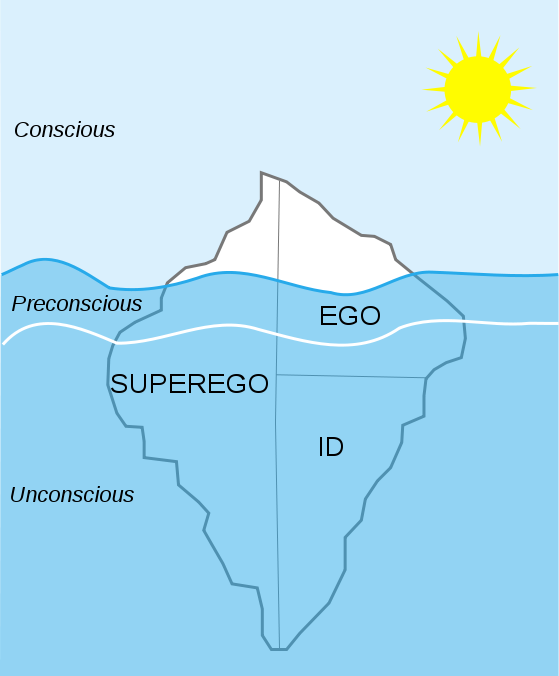The Ego - C.G Jung
C.G Jung: The Ego
The ego mentioned, the Latin “I”, the us that is conscious, interacting and reacting to our external and internal reality(s).

The ego mentioned, the Latin “I”, the us that is conscious, interacting and reacting to our external and internal reality(s).
The ego comprises the organized part of the personality structure that includes:
defensive
perceptual
intellectual-cognitive
and executive functions.
Conscious awareness resides in the ego,
although not all of the operations of the ego are conscious.
Originally, Freud used the word ego to mean a sense of self, but later revised it to mean a set of psychic functions such as:
judgment
tolerance
reality testing
control
planning
defense
synthesis of information
intellectual functioning
and memory
The ego separates out what is real.
It helps us to organize our thoughts and make sense of them and the world around us.
Jung included the ego in a broadly comprehensive theory o complexes, complexes,
often referring to it as the ego-complex as illustrated when he said
“I understand ego as a complex of ideas which constitutes the center of my field of consciousness and appears to possess a high degree of continuity and identity“.
According to Jung, the Ego – the “I” or self-conscious faculty – has four inseparable functions, four different fundamental ways of perceiving and interpreting reality, and two ways of responding to it.
The four ego functions postulated by C.G. Jung in Psychological Types are:
Sensation
Thinking
Feeling
Intuition
Jung suggested that people start life developing one of these four ego functions, and at various stages throughout their life may develop others, the undeveloped ones having less effect on their cognition.
Typically, the second ego function might become developed during adolescence, and the development of a third accounts for mid-life crises.
theory of complexes
Jung included the ego in a broadly comprehensive theory of complexes,
often referring to it as the ego-complex as illustrated when he said
“I understand ego as a complex of ideas which constitutes the center of my field of consciousness and appears to possess a high degree of continuity and identity“.
Complex existence is widely agreed upon in the area of depth psychology.
It assumes the most important factors influencing one’s personality are deep in the unconscious.
They are generally a way of mapping the psyche and are crucial theoretical items of common reference to be found in therapy. Complexes are believed by Carl Jung and Sigmund Freud to influence the individual’s attitude and behaviour.
A “complex”
Some complexes usurp power from the ego and can cause constant psychological disturbances and symptoms of neurosis.
meaning a personal unconscious,
the core pattern of emotions
memories
perceptions
and wishes
organized around a common theme, such as power or status.
According to Jung’s personality theory, complexes are building blocks of the psyche and the source of all human emotions.
Complexes are thought to operate
“autonomously and interfere with the intentions of the will, disturbing the memory and conscious performance“.
Complexes are not negative in themselves, but their effects often are.
An example of a complex would be as follows:
if you had a leg amputated when you were a child, this would influence your life in profound ways, even if you were wonderfully successful in overcoming the handicap. You might have many thoughts, emotions, memories, feelings of inferiority, triumphs, bitterness and determinations centering on that one aspect of your life. If these thoughts troubled you, Jung would say you had a complex about the leg.
Some complexes usurp power from the ego and can cause constant psychological disturbances and symptoms of neurosis.
With intervention, it may become conscious and greatly reduced in their impact.
Jung proposed four main functions of consciousness:
- Two perceiving functions: Sensation and Intuition
- Two judging functions: Thinking and Feeling
The functions are modified by two main attitude types:
Extraversion
Introversion
Jung theorized that the dominant function characterizes consciousness, while its opposite is repressed and characterizes unconscious behavior.
The eight psychological types are as follows:
- Extraverted sensation
- Introverted sensation
- Extraverted intuition
- Introverted intuition
- Extraverted thinking
- Introverted thinking
- Extraverted feeling
- Introverted feeling
Jung described the power complexes can hold when he said "what is not so well known, but far more important theoretically, is that complexes can have us.
The existence of complexes throws serious doubt on the naive assumption of the unity of consciousness, which is equated with 'psyche,' and on the supremacy of the will.
Every constellation of a complex postulate a disturbed state of consciousness.
The unity of consciousness is disrupted and the intentions of the will are impeded or made impossible.
Even memory is often noticeably affected, as we have seen. The complex must therefore be a psychic factor which, in terms of energy, possesses a value that sometimes exceeds that of our conscious intentions otherwise, such disruptions of the conscious order would not be possible at all.
And in fact, an active complex puts us momentarily under a state of duress, of compulsive thinking and acting, for which under certain conditions the only appropriate term would be the judicial concept of diminished responsibility".
On the other hand, Jung identified the development of the differentiating functions as essentially the development of useful complexes.
However, even here there are often undesirable side effects.
It is true that we do not refer to this [training and development of functions] as an obsession by a complex but as one-sidedness.
Still, the actual state is approximately the same, with this difference, that the one-sidedness is intended by the individual and is fostered by all the means in his power, whereas the complex is felt to be injurious and disturbing.
People often fail to see that consciously willed one-sidedness is one of the most important causes of an undesirable complex, and that, conversely, certain complexes cause a one-sided differentiation of doubtful value. (Jung, [1960] 1969:par. 255)

Comentários